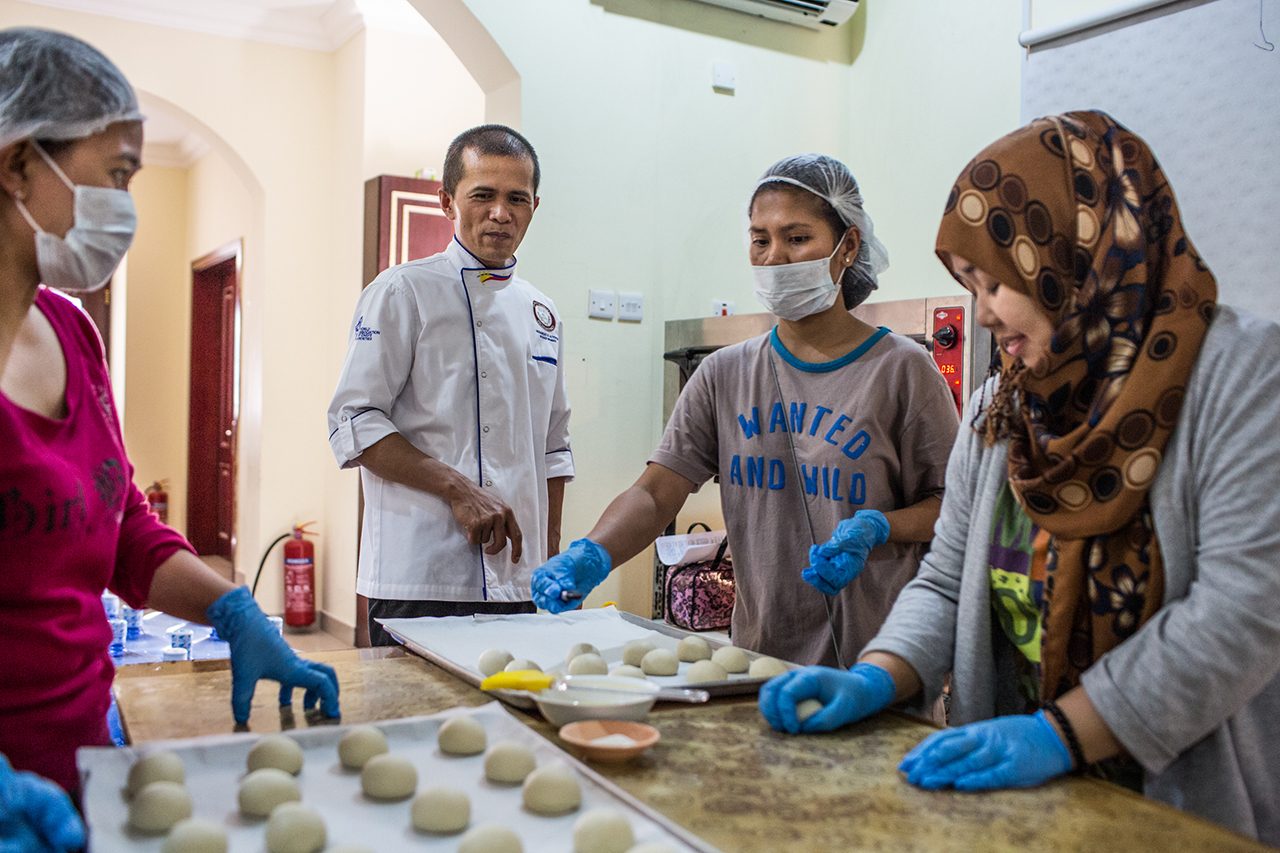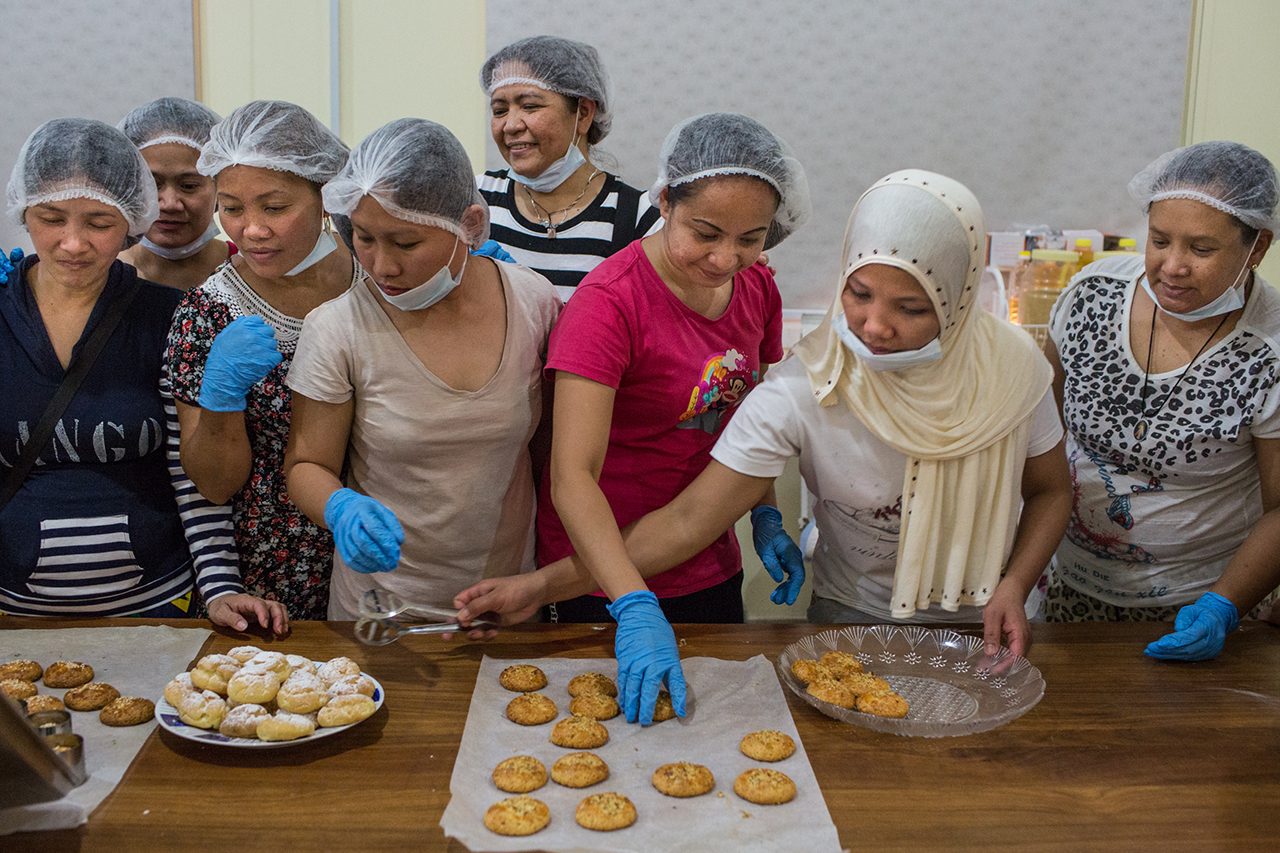SUMMARY
This is AI generated summarization, which may have errors. For context, always refer to the full article.

DOHA, Qatar– It starts at about 8:30 am. The women will scoop up their hair into hairnets, deftly tucking in stray wisps; then they will snap on blue gloves. What follows is a flurry of activity.
Bowls, whisks, spatulas and baking sheets will be lined up. The repeated tat-tat-tat as eggs are whisked to repetitive beat then mixed with flour with the help of a whirring mixer. What comes out is soft squishy dough ready to be rolled up into small balls on cookie sheets lined with wax paper.
It won’t be long before the scent of freshly baking bread will waft into the other rooms. People will be lured away from their desks to enjoy the smells and take a bite or two.
This is the baking class that takes place every morning at the Migrant Workers and Other Filipinos Resource Center a training center and shelter for Overseas Filipino Workers (OFWs) run by the Philippine embassy and the Philippine Overseas Labor Office (POLO).
The baking class is comprised of about 30 female OFWs who are all in some kind of in limbo.
“These are women who have pending court or police cases; some are waiting for their unpaid wages to be released; some runaway from their employer. It’s a mix of situations,” explained Des Dicang, labor attaché for the Philippine embassy and POLO.
Their circumstances and the kafala sponsorship system prohibit them from working for another employer or seeking employment while their cases and travel documents are being processed. In the meantime, there is nothing much to do but wait – and bake.
The baking classes offer a way to turn idle time into a productive pastime.
Other lessons offered by the Philippine embassy include cosmetology and computer classes, but the baking class taught by chef Gerry Atencio seems to be the most popular.
Passing it on
Atencio, 47, did not formally study baking or culinary arts. He learned everything he knows on the job working for Goldilocks for 5 years before leaving in 1995 to work as a cook in an international cruise ship in Bahrain. For almost 13 years now, Atencio has been working in Doha as the chef to a member of the royal family, the brother of the emir of Qatar.
Atencio is one of the volunteers who offer their time to share their skills with other OFWs. He is also a board member of the Qatar Culinary Professionals, comprised of all the foreign chefs working in Qatar. As an accredited member of the World Association of Chefs Society, Atencio gets to participate in trainings and competitions. His job and other commitments make for a jampacked schedule but he insists that sharing his time with other OFWs is as fulfilling as his job.
Every day, Atencio is at the shelter by 9 am. The class finishes at around 12 noon giving him enough time to start work as a personal chef.
“Actually, isa pa akong marino (I was a sailor). I am an undergraduate of marine engineering. Dahil dito sa skill na ito na pagluluto at pagbe-bake, makakapagpa-graduate na ko next year,” said Atencio whose wife and two children are in the Philippines. (But because of my skills in cooking and baking, I was to provide for and raise my children, one will be graduating next year.)
Atencio’s own experience shows how a skill like baking and cooking can bump you up in the employment ladder and uplift your life. He considers himself lucky to have gotten his training on the job because paying for a baking course and purchasing the necessary tools of the trade make it an expensive skill to learn.
“It makes me happy to share this skill that I have. I have nothing else to give. I don’t have money,” he laughed good-naturedly. “But I have a skill that I can pass on.”

Survival and hope
The baking course covers basic food, safety, and hygiene and also includes modules like bread making, pastry, and cakes. The women learn how to make star break bread (which Atencio says is “pinaputok na monay” in the local language), cream puffs, and eclairs.
Jenny Rose Maat, a 25-year-old domestic worker left her employer after 7 months when they couldn’t give her her salary regularly. She’s been attending the baking classes since July and is quite proud of herself.
“Dito lang ako natuto mag-bake. Dati bumibili lang ako ng tinapay. Ngayon yun mga tinapay na kinakain ko, alam ko na gawin lahat,” said Maat. (I only learned how to bake here. I used to buy bread. Now, I know how to make bread.)
“Promise ko sa kanila, habang nandito ako sa Qatar, magtuturo ako sa kanila,” beamed Atencio. (I promised them that I will teach them as long as I’m in Qatar.)
That’s a promise that is most reassuring for women like Dang Bumatan who ran away from her employer after 3 months. The 27-year-old domestic worker said her employer withheld her salary and physically abused her. She’s been attending the baking class for about two weeks now.
“Dito lang ako natuto mag-bake. Nalilibang ako, nakakalimutan ko nga problema ko, tapos natututo pa ako. ‘Pag nakabalik ako sa Pilipinas, puwede na ako mag-apply mag-bake. Kahit hindi na ako mag- abroad uli, makakatrabaho ako,” said Bumatan.
(I only learned how to bake here. It gives me something to do with my time. I forget my problems and I get to learn. When I go back to the Philippines, I can apply for baking jobs. Even if I don’t go abroad again, I can find a job.)
Most recently, Atencio added food carving as one of the modules.
“The courses offer re-tooling or upgrading of skills, but it’s also about survival. We would want them to be able to earn on their own when they go back (to the Philippines). It’s about giving them hope,” said labor attaché Dicang. – Rappler.com
Reporting for this project was supported by the Pulitzer Center on Crisis Reporting
Add a comment
How does this make you feel?





There are no comments yet. Add your comment to start the conversation.